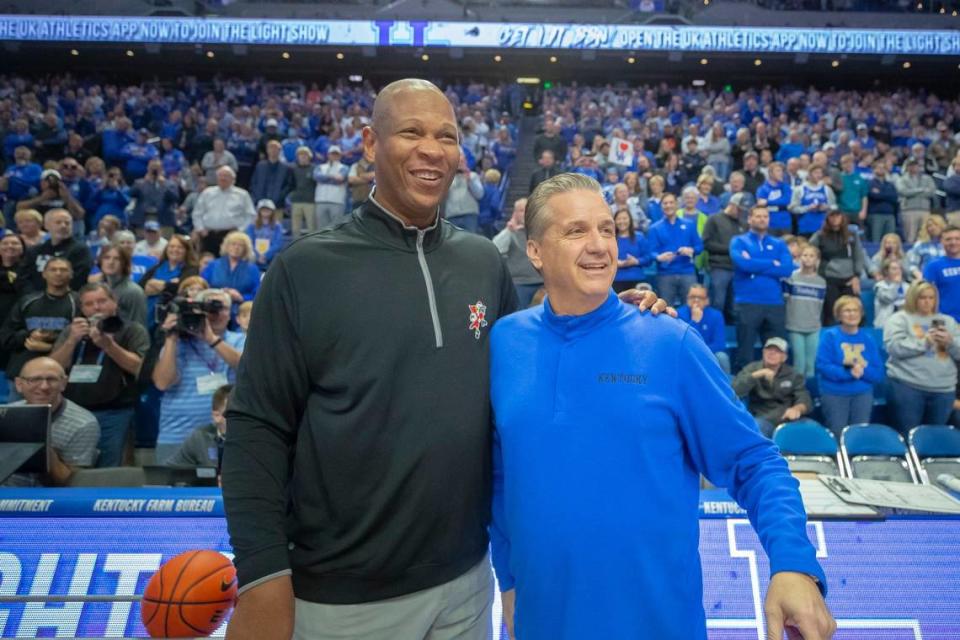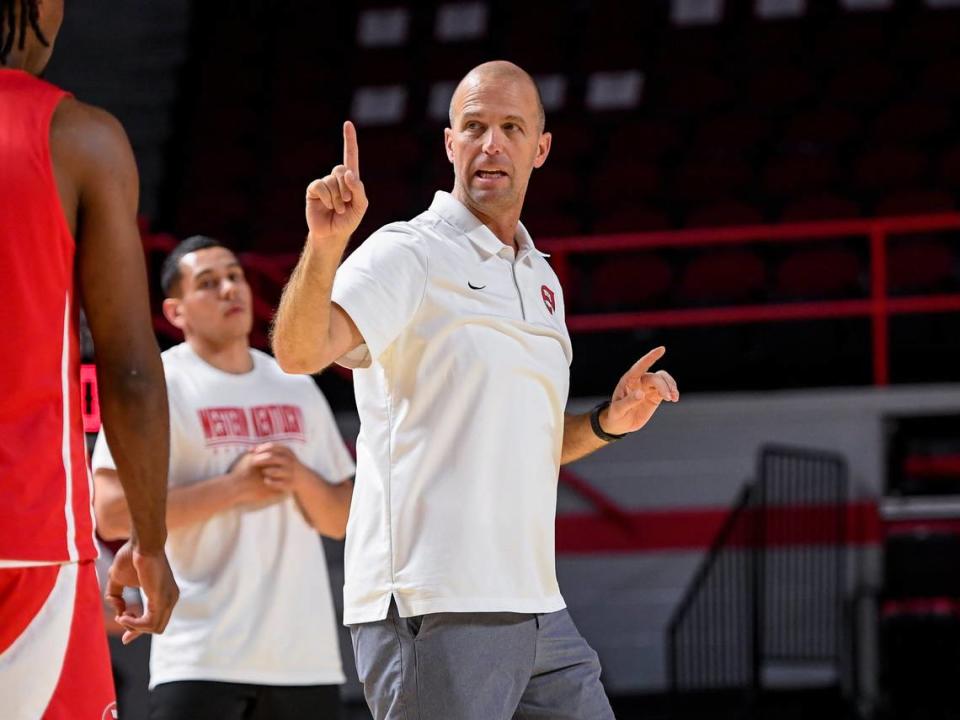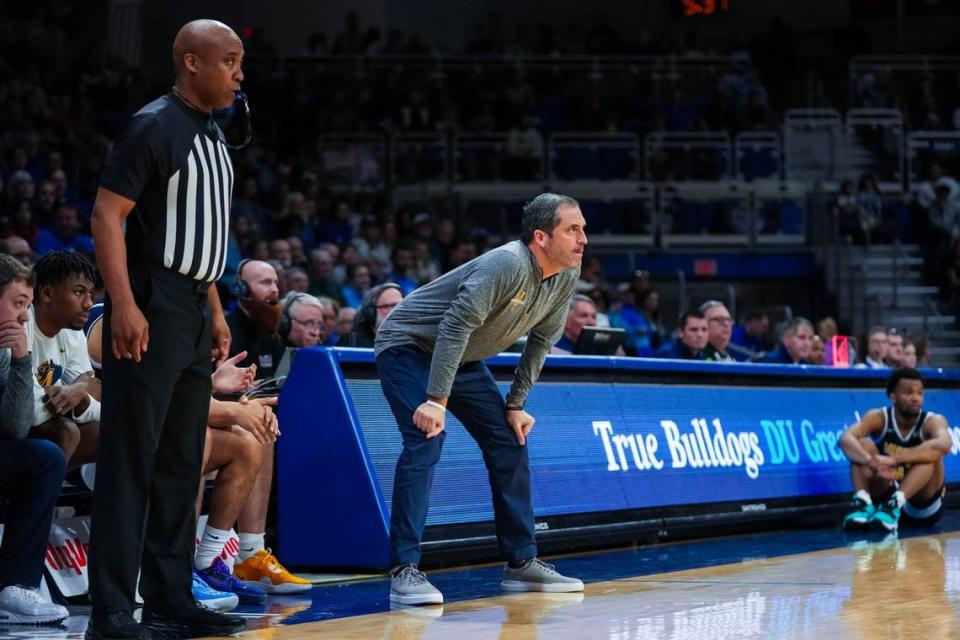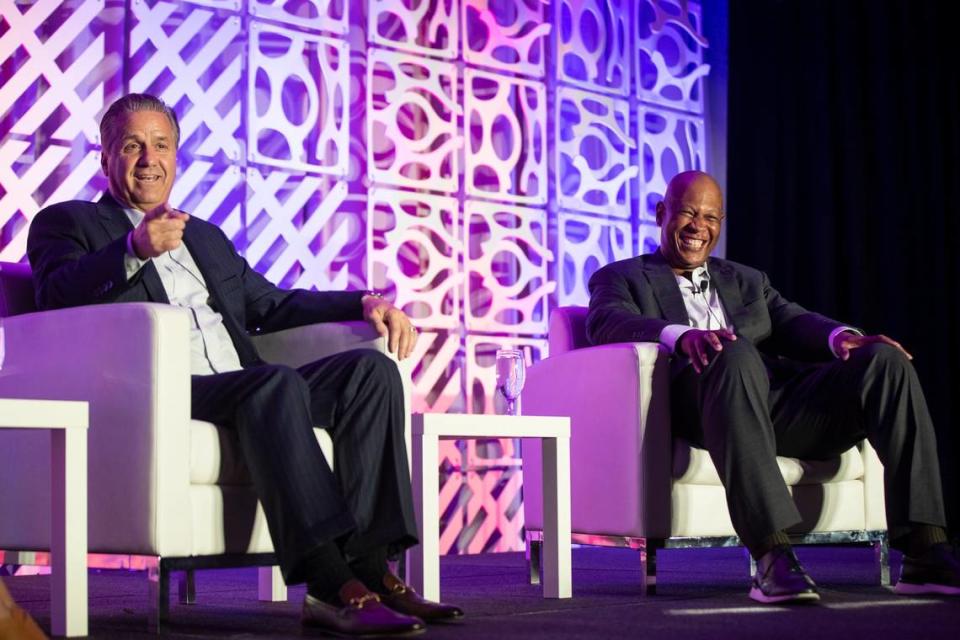College hoops is back. Here’s how much Division I coaches in Kentucky will earn this year.
- Oops!Something went wrong.Please try again later.
- Oops!Something went wrong.Please try again later.
- Oops!Something went wrong.Please try again later.
- Oops!Something went wrong.Please try again later.
College basketball rules supreme in Kentucky, and another season of the sport in the commonwealth is just around the corner.
From Murray State to Morehead State, 16 men’s and women’s NCAA Division I programs are poised to tip off the 2023-24 college basketball season, all harboring hopes of reaching the NCAA Tournament in March.
But who are the people leading these programs, and what are they being paid along with other contractual perks to try and lead their respective schools to March Madness success?
The Herald-Leader obtained the contracts for 14 of Kentucky’s Division I men’s and women’s college basketball coaches via the Kentucky Open Records Act. (Bellarmine, a private university in Louisville, is not subject to public records requests, and the contracts for Bellarmine men’s basketball coach Scott Davenport and women’s basketball coach Chancellor Dugan were not made available to our reporter.)
From what each coach is paid annually to the incentives included in their contracts, several trends emerged across seven of the commonwealth’s Division I programs. Here’s what we found:

John Calipari, Kenny Payne state’s top-paid coaches
To the surprise of no one, Kentucky’s John Calipari and Louisville’s Kenny Payne are the top earners in the state when it comes to college basketball coaches.
Calipari’s “lifetime contract” has been the source of plenty of discourse since it was signed in spring 2019.
“One of the truly unique things about Kentucky men’s basketball is its legacy of head coaches who have made their own lasting mark on this program. John is a perfect illustration of that,” UK Athletic Director Mitch Barnhart said at the time.
“(John) has added a special chapter to the greatest tradition in college basketball, and it’s a chapter we want him to continue writing until the end of his coaching career. We are pleased to announce a new contract that will enable him to do exactly that.”
There are still six years remaining on that contract: Calipari — who was recently passed by UK football head coach Mark Stoops as the highest-paid public employee in Kentucky — will make $8.5 million to coach the 2023-24 and 2024-25 seasons before his annual pay jumps to $9 million for the 2025-26, 2026-27, 2027-28 and 2028-29 seasons.
Starting in July 2025, Calipari’s $9 million annual salary would pull him even with Stoops.
Calipari’s base salary from the school is only $400,000, with the bulk of his yearly pay coming from multimedia rights and other “university agreements.” How does that work? UK enters into multi-million dollar agreements for exclusive TV, radio and digital deals in addition to contracting with suppliers of athletic gear and equipment. Calipari grants UK his “rights of endorsement” in all of those areas and is compensated from that fund. Stoops earns most of his money the same way.
“I’m here because I can recruit the best of the best here. That’s why I’m here,” Calipari said when he was introduced as UK head coach in April 2009.
When he signed the extension 10 years later, he said, “There is no other place I want to be. As I look forward, my mindset is what’s next and how can we be first at it for the young people that we coach.”
Since signing the extension, one of the most-discussed talking points about the new deal is whether Calipari will see it through in the capacity of Kentucky head coach.
Following this 2023-24 season, Calipari could opt to trigger an “ambassador” clause in the contract, allowing him to remain a part of the UK athletics department and assist the university in fundraising, promoting the basketball team and other UK sports programs. Calipari would be paid $950,000 annually in this capacity.
(Louisville women’s basketball head coach Jeff Walz has a similar clause in his contract with the Cardinals.)
Aside from this ambassador clause, the other routes for Calipari to no longer coach the Cats are if he walks away for another job, or if he is fired.
Calipari has no buyout in his contract, which means he can leave for another job without paying anything to UK.
If Kentucky were to fire Calipari without cause following the 2023-24 season, UK would have to pay Calipari $33.375 million.
Right behind Calipari in the annual pay rankings among college basketball coaches in Kentucky is Kenny Payne, who is entering his second season leading the Louisville men’s program.
There’s not much to be said about the 2022-23 U of L season — Payne’s first as head coach of the Cardinals — that hasn’t already been discussed: Louisville went 4-28, a historically bad season for a storied program.
Payne was paid $3.35 million to oversee that disastrous debut season, with $1.675 million coming in base salary and another $1.675 million paid through “additional compensation.” Much like for Calipari, that additional compensation for Payne results from broadcast appearances, promotional activities and agreements with apparel companies — currently Adidas in U of L’s case and Nike for Kentucky.
Payne was paid the equivalent of $837,500 per victory last season.
“The one question I had to answer above all others wasn’t whether or not the coaches I talked to could coach, every one of them had proven that ability,” Josh Heird — then the interim and now the full-time athletics director at Louisville — said during Payne’s introductory news conference in March 2022.
“Rather, the right person for this job had to prove to me they were willing and able to shoulder the challenge of connecting this city.”
Payne’s contract, which runs through March 2028, is structured in a way that his annual pay can only be boosted by on-court success: Payne’s base salary can increase only if the Cardinals reach the NCAA Tournament.
His base salary, and therefore his total annual pay, will increase under the following conditions:
▪ By $100,000 a year if Louisville makes the NCAA Tournament, or,
▪ By $150,000 if Louisville reaches the NCAA Tournament’s round of 32, or,
▪ By $250,000 if Louisville reaches the NCAA Tournament Sweet 16, or,
▪ By $300,000 if Louisville reaches the NCAA Tournament Elite Eight, or,
▪ By $400,000 if Louisville reaches the NCAA Tournament Final Four.
These potential increases in base pay would apply to Louisville’s first and second NCAA Tournament appearances under Payne.
For example, if the Cardinals were to make the Final Four in both the 2024 and 2025 editions of the NCAA Tournament, then Payne would, under his current contract, see his annual pay increase by $400,000 after each Final Four appearance.
Under this deal, Payne would also receive bonuses for each NCAA Tournament appearance starting with his third.
All of Payne’s potential bonuses come with a stipulation: He will only get the bonuses if “the most recently calculated NCAA Academic Progress Rate multi-year score for the team roster as of the date of such event meets or exceeds 950.”
Other potential bonuses for Payne include $50,000 if Louisville finishes atop the ACC regular season standings and $50,000 for winning the ACC Tournament.
Payne is also scheduled to receive a retention bonus payment of $300,000 if he’s still the Cardinals’ head coach on April 1, 2025.
But the more pertinent question with Payne isn’t how much his pay could increase, but rather how much longer he will be paid at all by U of L.
Currently, Louisville has to pay Payne $8 million if the school was to fire him without cause. That amount drops to $6 million next season, and then $4 million the season after that.
On Payne’s end, he has a $2.5 million buyout he must pay if he leaves Louisville to become a college head coach elsewhere. If Payne were to leave U of L to become an NBA head coach, that buyout is set at $1.5 million.
The aforementioned Walz is easily the best-paid women’s basketball coach — and third-highest overall — in Kentucky: He will receive $1.75 million in base salary for the 2023-24 season, and that amount will continue to increase by $50,000 each year for the rest of his current contract.
Walz’s contract with the Cardinals — quite a bit ahead of the $775,000 Kentucky is paying women’s coach Kyra Elzy — stretches through the 2028-29 season, and he will be paid $2 million to coach Louisville during that 2028-29 campaign.
Louisville has made the NCAA Tournament 14 of a possible 15 times with Walz, including 12 appearances in the Sweet 16.
The Cardinals have twice reached the NCAA Tournament championship game (in 2009 and 2013) with Walz as head coach.
Steve Lutz is next highest-paid men’s head coach
The next highest-paid coach in the commonwealth is someone yet to coach a game at his current school.
Rick Stansbury resigned as Western Kentucky’s head coach in March after compiling a 139-89 overall record, but no NCAA Tournament appearances, in seven seasons in Bowling Green.
WKU athletics director Todd Stewart went with a sensible hire to replace Stansbury: former Texas A&M-Corpus Christi head coach Steve Lutz, a longtime college assistant who spent time on the bench at SMU, Creighton and Purdue, among others.
In both seasons he was the head coach of the Islanders, Lutz took Texas A&M-Corpus Christi to the NCAA Tournament, winning a game in the First Four earlier this year.
In the hopes of returning the Hilltoppers to March Madness for the first time since 2013, WKU signed Lutz to a contract that runs through June 2027, although the deal features automatic one-year extensions that would keep Lutz under contract through June 2030.
“I fully understand what it means to be the head coach at Western Kentucky University,” Lutz said at his introductory press conference in March. “… I am not shy about what we are here to do. We’re here to win games. We’re here to win conference championships. We’re here to go to the NCAA Tournament and win games.”
Lutz is paid $650,000 annually, with the ability to earn an extra $100,000 for getting Western Kentucky to the NCAA Tournament, among other potential bonuses.
Part of Lutz’s contract, as also for WKU women’s basketball head coach Greg Collins, includes the potential to earn more money if more fans show up inside the 7,326-person capacity E.A. Diddle Arena.
Lutz will receive 50% of all gross ticket revenues that exceed $900,000, each season.
Does Kentucky college basketball have long-term coaching continuity?
Of the 16 combined men’s and women’s NCAA Division I college basketball programs in the commonwealth, a common theme is coaching turnover.
Only one program, the Bellarmine men’s team, hasn’t made a coaching change since 2006: Scott Davenport has stuck with the Knights during their transition from the Division II to the Division I level, becoming the school’s all-time wins leader in the process. At 413-148 across 18 seasons, Davenport also has the best winning percentage (.736) in school history.
But that’s not the norm for the other 15 Division I college basketball programs in Kentucky.
At least two different people have served as the head coach for each of these 15 other programs since 2006.
The Louisville and Western Kentucky men’s teams, and the Morehead State women’s team, have each had five different coaches over the past 18 years.
In this span, Murray State’s Steve Prohm has twice been hired to coach the Racers, in May 2011 and March 2022.
Prohm’s most recent contract runs until March 2027, and he can earn automatic one-year extensions for winning 20 games in a season. Prohm is paid $520,000 annually.
“How can you be significant in your leadership role? How can you be impactful? How can you invest? And how can you really, really make a difference in these young mens’ lives?” Prohm said in March 2022 when he was introduced as Murray State’s head coach for a second time.
“That’s my real focus — whether it’s academically, athletically, socially, spiritually — that’s my focus going forward as I take the reins here for a second time.”
There are several reasons for this high volume of coaching turnover in the commonwealth.
One is simply the caliber of head coaches that have come through Kentucky’s Division I programs.
Since 2006, the Murray State men’s team has been led by Mick Cronin (now at UCLA), Billy Kennedy (who left Murray to become the head coach at Texas A&M) and Matt McMahon (who left Murray for LSU in 2022).
In between his two stints at Murray State, Prohm himself was at a top-tier job at Iowa State.
At the same time, this coaching turnover is also reflective of the modern college basketball landscape.
Since the start of last season in Division I men’s basketball, there has been more than 60 coaching changes.



Ranking basketball coaching pay in Kentucky
Among Division I schools, Kentucky and Louisville lead the way in annual pay for the 2023-24 college basketball season:
1. John Calipari | Kentucky men | $8.5 million |
2. Kenny Payne | Louisville men | $3.35 million |
3. Jeff Walz | Louisville women | $1.75 million |
4. Kyra Elzy | Kentucky women | $775,000 |
5. Steve Lutz | Western Kentucky men | $650,000 |
6. Darrin Horn | Northern Kentucky men | $544,000 |
7. Steve Prohm | Murray State men | $520,000 |
8. A.W. Hamilton | Eastern Kentucky men | $350,000 |
9. Preston Spradlin | Morehead State men | $260,000 |
10. Greg Collins | Western Kentucky women | $200,000 |
11. Greg Todd | Eastern Kentucky women | $160,000 |
12. Camryn (Whitaker) Volz | Northern Kentucky women | $156,083 |
13. Rechelle Turner | Murray State women | $130,000 |
14. Cayla Petree | Morehead State women | $96,000 |
Note: The coaching contracts for Bellarmine, a private university, were not subject to Kentucky’s open records law.
